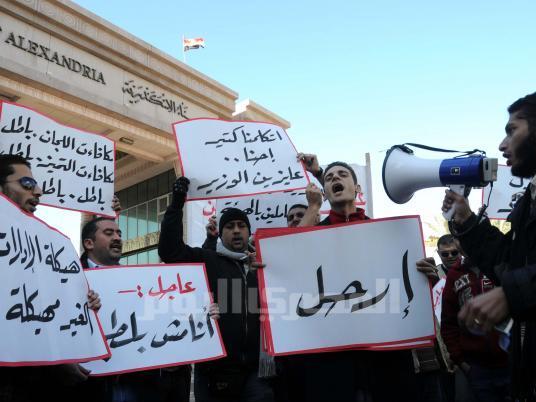
Under a glaring sun, thousands in Alexandria gathered to mark the revolution's one year anniversary on Wednesday. The atmosphere was one of both celebration and protest.
The navy and army organized a military band to perform at the Tomb of the Unknown Soldier along the Corniche, where a small group, mainly made up of young men and police officers, gathered to watch.
One man, wearing Islamist attire, stood at the front of the crowd. He bowed to officers, who cordoned off the band, and chanted, "Long live the military" in between musical performances. On one of these occasions, two passersby chanted, "Down with military rule" in return. As though on cue, band members commenced beating their drums and blowing into their trombones.
The affair, which seemed highly orchestrated, drowned out the sound of opposition and served as an early indication of tensions that would surface throughout the day.
A few meters away, a very different group gathered outside the Al-Haqaniya court, from where workers and socialists were to launch their march.
Political campaigns such "Military Liars," "No to Military Trials for Civilians," and those supporting pro-revolution imprisoned army officers were also present.
Here, the sound of anti-military chants and criticism of the military junta's head, Field Marshal Hussein Tantawi, could be heard.
"We're here to protest, not celebrate, because the revolution's demands are not yet complete. Bread, freedom and social justice have not been achieved, nor have martyrs' rights," said Hazem Helal, a market supervisor.
"The military also needs to return to its barracks. We don't want the Pakistani model in Egypt," he added.
Workers present included those belonging to independent syndicates, such as petroleum workers at Exxon Mobil. They were demanding permanent employment contracts and an end to corrupt privatization deals.
Mahienour el-Massry, a prominent Alexandria activist, said that last year witnessed achievements but that Mubarak's regime still lingers and social justice remains unachieved.
Commenting on the year ahead, she said activists should "focus less on protests and sit-ins, which can feel detached, and more on supporting independent syndicates and creating popular committees to monitor things like police violations and corruption. People need to feel more empowered that they can be the agents of change."
Light celebrations at Qaid Ibrahim
While hundreds gathered at the courts, the crowd numbered thousands outside the Qaid Ibrahim mosque where the Muslim Brotherhood controlled the podium. The focus was on martyr's rights, and a tent displayed pictures of martyrs.
The atmosphere was one of remembrance, as well as celebration of what was achieved last year. "Lift your head up, you're Egyptian" could be heard from speakers set up to play music.
"Egyptians have a right to celebrate, because who would have thought we could get rid of Mubarak or take on the Central Security Forces? But we still have much to achieve in developing the country," said Mohamed Abdel Aziz, a 22 year-old engineer and Muslim Brother.
The Muslim Brotherhood rose to power this year in parliamentary elections through their political arm, the Freedom and Justice Party, after years of being oppressed and banned under Mubarak's regime.
Brotherhood members spoke of using Parliament as a means to protect people's rights, return funds stolen by Mubarak and his allies, and ensure that those accused of killing protestors are tried.
Some martyrs' families were skeptical, though, of the Brothers' will to achieve justice for them.
"They're just interested in political gains," said Ramdan Ramdan, a retired military officer, whose 16-year-old son was killed on 28 January.
"Justice will be achieved with my bear hands."
Itimad Ali, whose 18-year-old son also died on 28 January, said: "God first will achieve my rights… We cannot celebrate today, because officers accused of killing our sons have not yet been tried."
Alexandria is at the heart of a regime characterized by police brutality.
It was here that Khaled Saeed, a 28-year-old man, was beaten to death by police officers in June 2010. This incident sparked a protest movement that helped lead to the 25 January uprising.
Ending at a military zone
There were no Salafis in sight at Qaid Ibrahim, where many joked that they would be put off by the music. Salafis subscribe to a fundamentalist version of Islam, and some consider music and celebration profane.
But they were present at Alexandria's northern military zone in the Sidi Gaber area, where the day's marches would later link up and disperse.
The other marches that met here included those leaving from the Two Saints Church, the Virgin Mary Church and two student marches from Alexandria University.
A 26-year-old Nour Party member and government employee, who declined to give his name, said the Salafis were present in the military zone rather than at Qaid Ibrahim because they took it upon themselves to secure that area, while the Brothers secured the mosque.
"We don't support military rule, but want presidential elections to happen before power is transferred," he said.
The Salafis, also made up of members from the Dawaa Salafiya movement, bore no visible signs of their religious or political affiliation other than their attire and long beards. The Muslim Brotherhood, on the other hand, wore jackets and scarves with their group's name.
Asked why, the government employee said: "Because we are with the people, and we don't want to stand apart from them."
For Mariam Othman, a university tutor of biostatistics, group divisions made the day disappointing.
"In the early days of the revolution, we were just people gathered around a set of demands. Today, everyone belongs to a certain identity group, meaning that we're less united."




